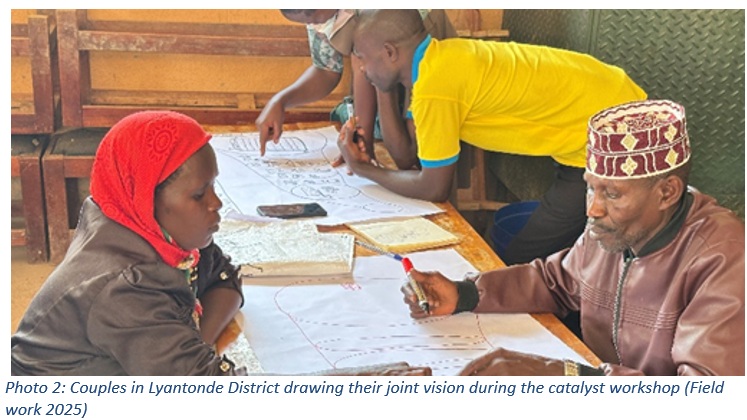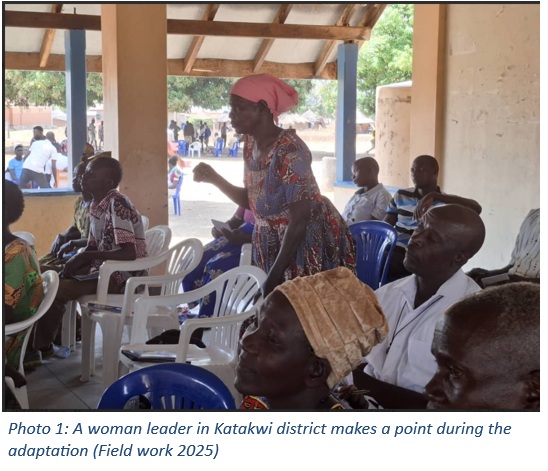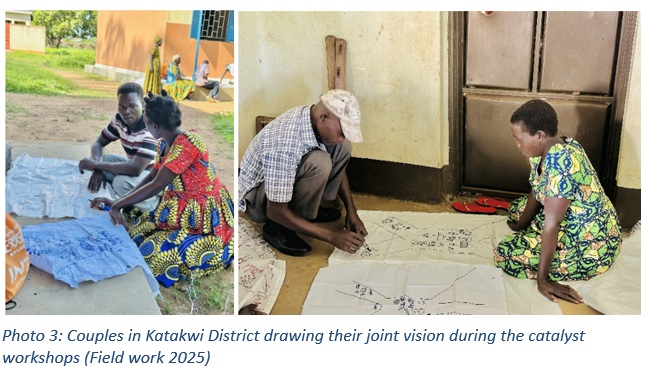
“Even a house can’t stand if the pillars are not equal….” Promoting Transformational Change for Effective Adaptation to Climate Shocks in Uganda’s Rural Farming Communities
/
By Florence Muhanguzi Kyoheirwe, Brenda Boonabaana and Phionah Birungi
A baseline study conducted in Lyantonde and Katakwi districts revealed entrenched gender inequalities in access to land, decision-making, and livelihood opportunities—disparities that are further exacerbated by climate-induced shocks such as erratic rainfall, prolonged droughts and declining soil productivity e.g. only about 26% of the women that participated in the baseline study are empowered. These intersecting vulnerabilities underscore the urgency of integrating the Gender Action Learning System (GALS) methodology to complement existing resilience-building efforts, ensuring that rural women and men are equally empowered to adapt and thrive in the face of environmental and socio-economic pressures. GALS methodology is implemented under the Women Smallholder Farmers’ Empowerment and Resilience (WOSFER) project, led by Makerere University’s Institute for Gender and Development Studies and the Association of Uganda Professional Women in Agriculture and the Environment (AUPWAE). The project funded by the Foreign Commonwealth Development Office (FCDO) and the International Development Research Centre (IDRC), seeks to strengthen the empowerment and adaptive capacity of women smallholder farmers in the cattle corridor of Uganda. With increasing climate change vulnerabilities intersected by high gender inequalities, the project is quite timely to make a difference.
What makes GALS methodology different?
GALS uses simple drawings and participatory exercises to help women and men reflect on their lives, identify challenges, and work out solutions as equals. No complicated text. No jargon. Just powerful visuals that everyone, irrespective of literacy levels, can use. GALS has the potential to empower smallholder farming households to dream together, plan together and act together which enhances a household’s adaptation capacity to climate change.
In the study sites, the GALS methodology rolled out in three key phases:
In the first phase, the adaptation workshops were conducted, aimed at engaging local leaders, religious institutions, and community representatives. The one-day sessions were meant to build trust and adapt GALS symbols and tools to local culture. This process ensures cultural relevance and resonance to facilitate local ownership and community participation in the co-creation of knowledge. With cultural adaptation, we were able to strategically challenge restrictive gender norms in subtle and respectful ways together with the participants. For example, cultural norms were represented by a spear (often associated with male dominance or protection) in Katakwi district.

Catalyst Change Workshops were where the magic happened. Seven hundred forty three (743) smallholder farmers and 8 sub county extension staff were trained over a 3-day period to map their goals, to reflect on their roles and find solutions to issues like unpaid care work, secrecy in finances and food insecurity using four participatory tools: 1) Challenge Action Tree; 2) Gender Balance Tree; 3) Vision Road Journey; 4) Empowerment Leadership Map. The tools focus on joint reflection, planning and accountability and allowed participants to analyze, dream and commit to working together. Activities included storytelling, drawing and picture presentation, role playing, experience sharing, and reference to religious scriptures (Christian/Islamic).

Men promised to begin fetching water and firewood for the family and allow women to get more involved in family budgeting. Couples committed in their drawings (especially the vision road journeys) to storing food for dry seasons and adopting climate-smart farming techniques like mulching, tree planting and using organic pesticides.

In the third phase household mentorship program was commissioned as a pathway for participants to support each other and sustain any positive change. Two mentor couples per parish (total of 32 couples) were selected during the Catalyst Change Workshops to support trained households to refine their tools and put them into practice. These mentors use guidelines written in the local language (Runyankore, Luganda and Ateso), ensuring that the support is accessible and culturally relevant.

Early lessons on ground
Early lessons from our ongoing monitoring visits, and feedback from mentors indicate that there is:
- Commitment to household transparency and resource sharing: Many men confess to previously hiding money or excluding spouses from decision-making but committed to joint planning and transparency.
- Improved communication and financial transparency: Men reported a shift from secrecy to shared planning with their spouse: “Before, I never told my wife how I used the money. Now, we plan and budget together.” – Male participant
- Reflections on domestic violence and household harmony: The training prompted candid reflections on harmful behaviours, particularly gender-based violence, and led to public confessions and pledges for change such as; After this training, I now understand that violence is not love. I want to change and build a peaceful home with my wife.” – Male participant, Mpumudde
- Improved confidence and voice among women: Women overcame fear and began asserting themselves in household and community decisions: “I feared talking to my husband about land. Today, I stood up and said we should decide together.” – female participant
- Created Male allyship: Male participants acknowledged past mistakes and embraced new roles of support and cooperation…“Before the training, I was my own boss in the home—now I am my wife’s partner…I came as a man. I leave as a better partner.” – male participant
- Understanding and appreciation of sharing household gender roles. Participants began to question and challenge entrenched gender norms, recognizing the unequal burden on women and expressing willingness to adopt more equitable practices. A mentor from Ngariam sub county had this to say “Drawing the Gender Balance Tree helped us understand how both men and women contribute to the home. We saw that income-generating activities and responsibilities can be shared, and when we work together, it benefits the whole family”.
- Awareness about local resources for food security. A female mentor from Mpumudde sub county said “I always used shop bought pesticides to spray my gardens and the cost was high but in the GALS training, we learnt that we can use things like kitchen ash and animal urine to make pesticides at home. I tried it and I have a very good harvest of beans. My husband and I are working together now and the change in our home is visible”
- Leadership and community support. A female mentor from Mpumudde sub county had this to say “I have been visiting all the six households allocated to my husband and I. we guided them to improve their tools and they are all determined to achieve their goals together”.
Conclusion
Because true transformation happens at home. GALS has shown that when women and men sit down together, with nothing but paper, pens and hope; they can change not just their households, but entire communities. The work in Lyantonde and Katakwi is proof that visual, inclusive, community-led approaches have a potential to break harmful norms and build resilience in the face of climate change. We conclude that when couples (and communities) begin to trust, plan and act together, transformation, social justice and equity become inevitable.

